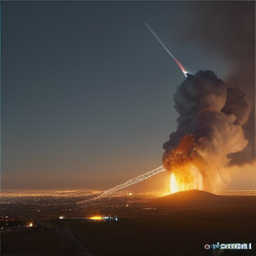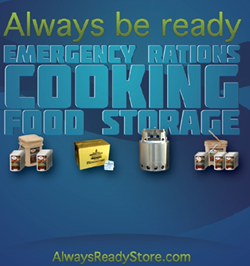Don’t Be a Prepper Frog: Avoiding the Slow Boil of Complacency
The old adage about boiling a frog is a powerful metaphor for the dangers of complacency. If you throw a frog into a pot of boiling water, it will instinctively jump out to save itself. However, if you place a frog in a pot of lukewarm water and gradually increase the heat, the frog will unwittingly adapt to the rising temperature until it’s too late. This analogy serves as a stark warning for those in the preparedness community who may have become too comfortable with the current state of affairs.
 The Gathering Storm
The Gathering Storm
The signs are all around us. Economic indicators point not just to a looming recession but to the potential for a global depression, with rising inflation, mounting debt, and the specter of widespread job losses threatening to destabilize global markets. Geopolitical tensions are escalating, with the war drums beating louder each day. The potential for major global conflicts looms on the horizon, conflicts that could disrupt supply chains, trigger resource scarcity, and fundamentally alter the fabric of our daily lives. What do you think your current job or the local grocery store will look like in the face of a major global war? Climate change is leading to more frequent and severe natural disasters, straining infrastructure and displacing populations. The convergence of these factors suggests that we are heading into uncharted territory, a perfect storm of crises that could test our resilience like never before.
The Lukewarm Climate:
In the wake of the global pandemic, many people have developed a false sense of security. They look back on the challenges faced during that time and think, “It wasn’t so bad.” They recall the short-term inconveniences of empty grocery store shelves and the rush to stockpile essentials like toilet paper. As a result, they believe that by throwing a few extra rolls of toilet paper in the closet and storing a couple of cans of beans, they are adequately prepared for any future crisis. This mindset is dangerously shortsighted.
The Slow Boil:
Just like the frog in the slowly heating water, we risk becoming desensitized to the warning signs around us. The steady stream of negative news, from economic instability to social unrest and geopolitical tensions, can gradually fade into background noise. We adapt to each new challenge, convincing ourselves that we will get through it just as we have before. However, this mindset fails to recognize that the heat is steadily increasing, and the water is getting hotter.
The Danger of Complacency:
Complacency is the enemy of preparedness. When we become too comfortable with the status quo, we lose our sense of urgency and fail to take proactive steps to protect ourselves and our loved ones. We may dismiss the need for comprehensive emergency plans, neglect to acquire essential skills, or fail to stockpile adequate supplies. This leaves us vulnerable to the very real possibility that tougher times are on the horizon.
Subscribe to PREPARE
The Need f or Vigilance
or Vigilance
In the face of these gathering storms, it is crucial that we remain vigilant and proactive. We cannot afford to be lulled into a false sense of security by the relative calm of the present moment. Instead, we must be mindful of the harsh reality that lies ahead and take steps to prepare accordingly. This means developing comprehensive emergency plans, acquiring essential skills, and stockpiling supplies to weather any potential crisis.
Building Resilience:
True preparedness goes beyond simply hoarding goods. It requires building resilience on multiple levels – physical, mental, and emotional. We must cultivate the skills and knowledge necessary to adapt to changing circumstances, from growing our own food to navigating off-grid scenarios. We must also cultivate mental and emotional resilience, developing the fortitude to face adversity head-on and maintain a positive mindset in the face of challenges.
Community Preparedness:
No one can go it alone in a crisis. Building strong, resilient communities is essential to weathering any storm. This means fostering connections with like-minded individuals, sharing knowledge and resources, and working together to create mutual support networks. By pooling our skills and resources, we can create a safety net that will help us all navigate the challenges ahead.
The Importance of Perspective:
It’s easy to become overwhelmed by the magnitude of the challenges we face. However, it’s important to maintain a sense of perspective. Throughout history, humanity has faced and overcome countless crises. We are resilient, adaptable creatures, capable of incredible feats of courage and ingenuity in the face of adversity. By drawing on this inner strength and working together, we can rise to meet any challenge that comes our way.
An Urgent Call to Action
The time to prepare is now. We cannot afford to be complacent, to assume that the relative calm of the present moment will last forever. We cannot expect that Government will rush to our rescue with bail-out resources and policies to protect our families. Certainly, we pray for our leaders and vote for those who share our values – but, the reality is that we need to take action to prepare our families for the looming difficulties. We must heed the warning signs and take proactive steps to build our resilience and prepare for the challenges ahead. This means developing comprehensive emergency plans, acquiring essential skills, stockpiling supplies, building strong communities of mutual support, and conducting honest assessments of our current state of readiness.
The Family Preparedness Audit
One crucial step in the preparedness journey is conducting a family preparedness audit. This involves taking a hard, honest look at your current state of readiness and identifying areas for improvement. Ask yourselves questions like: Do we have enough food, water, and essential supplies to sustain us for an extended period? Do we have the skills and knowledge necessary to adapt to off-grid living if needed? Have we developed a comprehensive emergency plan that accounts for various scenarios? By conducting this audit and addressing any gaps in your preparedness, you can ensure that your family is as resilient as possible in the face of any crisis.
In Conclusion: The analogy of the boiling frog serves as a powerful reminder of the dangers of complacency. We cannot afford to be lulled into a false sense of security by the lukewarm climate of the present moment. Instead, we must be mindful of the gathering storms on the horizon and take proactive steps to prepare. By building our resilience, cultivating essential skills, working together as communities, and honestly assessing our current state of readiness, we can weather any crisis that comes our way. The time to act is now, before the water gets too hot and it’s too late to jump out of the pot. Don’t be a prepper frog – be a resilient, proactive member of the preparedness community, ready to face whatever challenges lie ahead.








